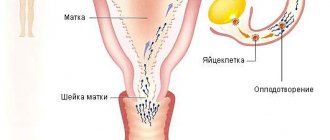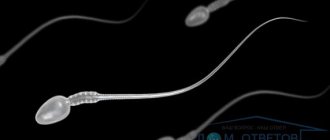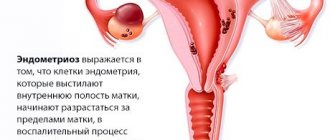“Women's autumn” is the name in modern society for the menopausal period among the fair half of humanity. And every woman approaches this kind of event in her life differently. Someone happily moves to the next stage of life, rejoicing that finally they no longer have to wait for menstruation to arrive and they can not be afraid of an accidental pregnancy, but drown headlong in the sea of pleasures of sexual life.
But, some individuals perceive this period very painfully, because menopause can occur at 35, when a woman, due to current life circumstances, has not yet had time to become a mother. That’s when the question arises: “Is it possible to get pregnant during menopause?”
Medical facts have confirmed that despite a decrease in the level of secretion of female sex hormones during menopause and a decrease in the reproductive functionality of the body, pregnancy can occur during menopause.
Moreover, if we take into account the fact that nature has predetermined and placed about 400 thousand free eggs in the female body for the entire reproductive period, then by the onset of menopause a small number of them remain in the body, which makes it possible to become pregnant during early menopause, although quite low.
Therefore, there is no need to think that pregnancy after menopause is not possible, since all favorable circumstances may arise in the body for the maturation of the egg, its fertilization and the further development of the fetus. If pregnancy during menopause is not desired, then it is recommended to use various methods of contraception, even in the complete absence of menstruation.
Let's take a closer look at whether pregnancy is possible during menopause, as well as what are the chances of mature women getting pregnant, signs of pregnancy during menopause, what the dangers of late pregnancy are for women, and how to avoid unplanned pregnancy in early menopause.
Probability of fertilization during menopause
Conception during menopause can occur only due to the presence of the following factors:
- the formation of a follicle in the ovaries, which serves as an incubator in which the processes of egg maturation occur;
- active production of progesterones and estrogens;
- preparing the uterus for the arrival of a fertilized egg.
However, menopause is characterized by reverse processes in the body, namely:
- quantitative decrease in follicle content;
- decline in the functionality of the ovaries, which leads to a decrease in the level of produced eggs;
- deterioration of hormonal levels in the body, characterized by a decrease in the level of secretion of sex hormones.
The result of such changes in the body of women in menopause is the reduction of the probability of ovulation processes to zero and the complete inability to give birth to children. But not every representative of the fair sex understands that menopause is a gradual decline in reproductive functionality that can last for many years.
For example, if a woman’s first signs of menopause appeared at the age of 43-44, then a 100% decline in reproductive function may occur only by the age of 50, or even later. Therefore, during these intervals between the fertile period and the onset of old age, there is a possibility of becoming pregnant during menopause.
How to distinguish menopause from pregnancy
Since both cases involve complete hormonal changes, many women do not know how to recognize the cause of their condition. Dizziness, lack of menstruation and nausea are signs of pregnancy and menopause at the same time. Even a test performed will not give a woman a definite answer to the question of what is happening to her - pregnancy or menopause, since the hormonal background in both cases is unstable. If you want to know the exact answer, you should definitely consult a gynecologist.
There are some distinctive features of menopause, so its onset can be determined by the presence of hot flashes, which are not typical for pregnancy. Menopause is also characterized by high blood pressure and severe headaches.
How does pregnancy manifest during menopause?
Pregnancy during menopause can most often occur with its early manifestation and be accompanied by manifestations in the form of:
- cessation of the menstrual cycle;
- morning sickness;
- changes in taste buds;
- increased sensitivity;
- increase in size of the mammary glands;
- individual intolerance to certain smells and foods;
- spasmodic nature of the psycho-emotional state;
- insomnia.
In this case, the signs of menopause and pregnancy are very similar, and not all women immediately understand that nature has given them a chance to find another joy in life, and for the first time or again experience all the delights of motherhood. Often women think that I am going through menopause, and all the symptoms that appear will pass sooner or later. But if a woman has recently been active sexually without using contraceptives, then it is impossible to say with certainty what the symptoms indicate - it could be menopause or pregnancy.
The use of conventional tests to determine pregnancy during menopause will not give definite results, since the effect of the tests is to determine the hormonal level in a woman’s body, which should change during pregnancy, but which also changes during menopause.
Therefore, in order to find out exactly what is happening in the body - menopause or pregnancy - you need to contact a specialist and undergo the necessary research.
Unwanted pregnancy
Even during menopause, there is always the possibility of becoming pregnant; due to the overlap of symptoms of menopause and pregnancy, it is very difficult to identify the latter in the early stages. To prevent unwanted conception, you need to use contraceptives during sexual intercourse for a long time, even in the absence of menstruation.
If the pregnancy test shows a positive result, and conception is unwanted, the gynecologist will advise methods that can be used to get rid of pregnancy. But if there is a chance to give birth to a healthy child, especially for a childless woman, then it is better to take advantage of it. You also need to remember that abortion is not a harmless procedure, and at this age it is even more risky for infection of the internal and external genital organs due to weakened immunity. If a decision is made to keep the fetus, it is necessary to undergo a full examination to ensure that it is healthy.
To prevent an unwanted pregnancy, you need to use contraception for at least a year, starting from the moment your last period ends. For these purposes, you can use hormonal agents that will further alleviate the symptoms of menopause.
If there are no periods or they become irregular, spotting alternates with heavy blood loss, and the woman’s general condition worsens, then she definitely needs to see a doctor. After confirming the onset of menopause, the specialist will recommend suitable contraceptives, this could be oral contraceptives or an intrauterine device.
The possibility of conceiving a child in different phases of menopause
The climacteric period in a woman's life is divided into three main phases, in each of which an unplanned pregnancy can occur, but with different probabilities. Let's look at each of them:
- The first phase of menopause is premenopause , characterized by the beginning of a decline in ovarian functionality. In premenopausal women, there is a high probability of fertilization and the possibility of becoming pregnant during menopause.
- The second phase of menopause - perimenopause , is characterized by a complete cessation of ovarian function, but its duration can vary from several months to a year. During this period, it is unlikely that pregnancy may occur. The chances of conceiving a child become zero in this period if there is no menstrual flow for 12 months after menopause.
- The last stage of the menopause is postmenopause . At this stage, no eggs are produced, and in the absence of eggs, pregnancy is impossible.
When asked whether a woman can become pregnant after menopause, many experts argue that this is possible, but only strictly according to individual characteristics, since such a pregnancy is not possible for every female body.
Sometimes, with an urgent desire to give birth to a child during menopause, doctors are forced to use the method of in vitro fertilization using a healthy donor’s egg. This method of fertilization gives a woman every chance of a normal pregnancy in adulthood and of giving birth to a healthy baby on her own.
How to detect pregnancy during menopause: and they gave birth to a bun...
Remember the old Russian fairy tale about the kolobok? Grandma and grandfather scratched your bottom, and a restless son appeared on you. In fact, there is nothing fabulous about it. Women over the age of... come to gynecology with such buns almost every day.
When a grandmother’s belly suddenly begins to grow, the first thing that is assumed is “fibroids.” In fact, fibroids turn out to be about 12 weeks pregnant. And here the question arises, how did experienced women who have repeatedly experienced childbirth not realize that they were pregnant? Diagnosis of pregnancy during menopause is exactly the same as in the normal state. And these signs are difficult to miss, especially if a woman is pregnant not for the first time.
Pregnancy during menopause can be diagnosed by the following signs (not all may be present):
- Frequent changes in mood and emotional background: you want to cry, memories come flooding back, it seems that those around you are not attentive enough.
- Noticeable weight gain.
- Periodic dizziness.
- The appearance of toxicosis: nausea after eating and when smelling strong odors.
- Enlarged mammary glands.
- Increased sweating.
- No bleeding from the vagina.
Even more interesting:
Apple cider vinegar for warts
Ovaries during menstruation
Yes, the symptoms are similar to those of menopause, but during pregnancy they are more acute. This occurs due to changes in the hormonal background of the expectant mother. To clarify the condition, you need to take tests and undergo an ultrasound scan, and not wait for the “bun” to start moving.
Health risks during late pregnancy
Pregnancy during menopause can negatively affect a woman's health. This is due to the fact that pregnancy leads to a number of changes in the body, which has a stressful effect on its general condition. And in the menopause, many changes already occur against the background of hormonal changes. In combination, pregnancy and menopause can contribute to the development of pathologies such as:
- diabetes;
- arterial hypertension;
- exacerbation of existing chronic diseases that are in remission;
- dysfunction of the renal organ system;
- violation of mineral metabolic processes;
- pathological decrease in the level of calcium in the skeletal system of the body, which contributes to the development and growth of the baby;
- high probability of prolapse of the internal pelvic organs;
- the risk of developing a genetic defect in a child (for example, Down syndrome), which increases with the physiological age of the mother. That is, the older a woman is at the time of conceiving a child, the higher the chances of developing this pathology, as well as the likelihood of prematurity or miscarriage.
Also, do not forget that often pregnant women aged 45-50 years and older have a desire to give birth on their own. This can lead to complications such as severe ruptures of the birth canal and profuse hemorrhage after childbirth, during which infectious microorganisms can enter the body and begin their pathological development.
The same complications can occur with gynecological abortions during menopause.
Therefore, every woman should think several times about whether pregnancy is even necessary at such a late age, since there is not much time left to raise and raise a child.
Is it possible to get pregnant during menopause?
It is well known that the likelihood of conception does not disappear immediately with the onset of menopause. And menopause itself is not a one-time, abrupt, but a gradual decline in female reproductive function. So is it possible to get pregnant during menopause, and how quickly is this ability lost?
Even before the onset of menopause, around the age of 40, the ability of eggs to fertilize decreases. Then, at the age of 45–50, premenopause - a period marked by increasing symptoms of menopause and lengthening intervals between menstruation.
What does this mean? About a decrease in the number of ripening eggs and a reduction in the production of female sex hormones. This stage of early menopause can last from one and a half to 10 years, until the last menstruation. Practicing gynecologists, in response to the question of whether it is possible to get pregnant during menopause, claim that the chance/risk of getting pregnant during ovulation during premenopause is approximately 10%.
However, it is at the age of 40–50 that the number of unplanned pregnancies increases sharply. This is due to the irregularity of the cycle and the unpredictability of “dangerous” days. In addition, many ladies relax psychologically, considering themselves already “old” to bear children. However, nature does not think so as long as the ovaries are able to produce at least one egg.
This leads to a logical answer to the question of whether it is possible to get pregnant during menopause. Yes, this is possible after 45, and after 50, and even (although extremely rarely) after 60 years. Thus, according to statistics, in 2015 in the UK, out of every 1000 mature women (40+), 15.2 gave birth. And the childbearing age in European countries has a steady upward trend.
Is it possible to get pregnant after menopause? No. In postmenopause, when menstruation is completely absent and the ovaries do not produce hormones at all, pregnancy is impossible. The average age of this milestone is 55 years.
Contraception during menopause
The most appropriate method to prevent unwanted and unplanned pregnancy should be selected by a qualified specialist. This is due to the fact that during menopause the immune system of the female body is significantly reduced and for the prevention and treatment of associated symptoms it is necessary to select contraceptives that will have preventive properties against cancer pathology and osteoporosis.
It is important to remember that when using intrauterine contraceptives there may be a risk of exacerbation of chronic diseases. And taking oral spectrum drugs can threaten the development of complications from the vascular system and metabolic processes.
Therefore, it is not recommended to independently select contraceptives during menopause. It is better to undergo all the necessary examinations and, together with a qualified specialist, taking into account all the individual characteristics of the body, choose the most suitable method of protection.
If, while taking contraceptive drugs, fertilization of the egg does occur (the chances of such a pregnancy occurring are very small, but the probability still exists), then before making any decision, a woman in adulthood should consider several times all the positive and negative aspects of such a piquant condition. Maybe it’s better to devote the rest of your life to yourself and your chosen one and enjoy all the delights of life, or plunge into motherhood, which can smooth out all the menopausal symptoms. In any case, the decision remains only with the woman.
Interesting and educational video on this topic:
About
What are the dangers of pregnancy after menopause?
Sometimes women decide to give birth after 48–50 years. This is facilitated by various factors - a new marriage, the desire to prolong youth, the loss of loved ones, etc. Before making a final decision, you should consult a doctor, since this step is fraught with many risks. The expectant mother is exposed to the following threats:
- If you have a predisposition to diabetes, the chance of developing the disease is quite high.
- During pregnancy, changes in blood pressure are possible. This condition is fraught with complications - stroke, heart attack, etc.
- Exacerbation of chronic diseases, of which older people have more than young women.
- With age, bone mass decreases due to natural reasons. The formation of the fetal skeleton can be an impetus for the development of osteoporosis in the expectant mother. This condition is dangerous because there are no initial symptoms of the disease. Once the clinical picture appears, treatment of osteoporosis becomes complex and lengthy.
- Double load on the kidneys often provokes disruption of their function, especially in women over 40 years of age.
- The process of childbirth is dangerous. Childbirth after 50 can lead to ruptures and bleeding, since tissue elasticity is reduced. Caesarean section, as an alternative to natural childbirth, is also not always preferable - there is a high risk of significant blood loss.
- After 40 years, the likelihood of multiple pregnancies increases. This is due to the fact that periods occur sporadically, and eggs accumulate in the ovaries without leaving their places on time. Multiple pregnancy and childbirth are a difficult test even for a young woman, and at a certain age (after 50) this condition can cause irreversible changes in the body.
At the same time, risks for the mother are not the only reason that many doctors do not recommend that women carry a child after menopause. There is also a danger for the baby:
- Children with chromosomal abnormalities (Down syndrome, etc.) are more often born to mothers over 35 years of age. After 40 years, the chance of having a child with such disorders becomes hundreds of times higher (we recommend reading:). If the mother is 48–50, the likelihood of having a baby with abnormalities is extremely high. According to statistics, out of 12 healthy children, 1 is born with genetic abnormalities.
- Complications more often occur - early miscarriage, frozen pregnancy, premature birth. Such situations are due to the fact that the mother’s body is not able to cope with the load.
- Doctors are against pregnancy of a lady who has been diagnosed with uterine fibroids. In this case, there is a possibility of growth of the formation, and this leads to disruption of fetal development. The child may not be getting enough nutrients for normal growth.
Readers of the website for mothers know by heart that a child is conceived when a mature egg meets a sperm. Therefore, on the one hand, pregnancy during menopause seems impossible. But life shows that everything is not so simple.










